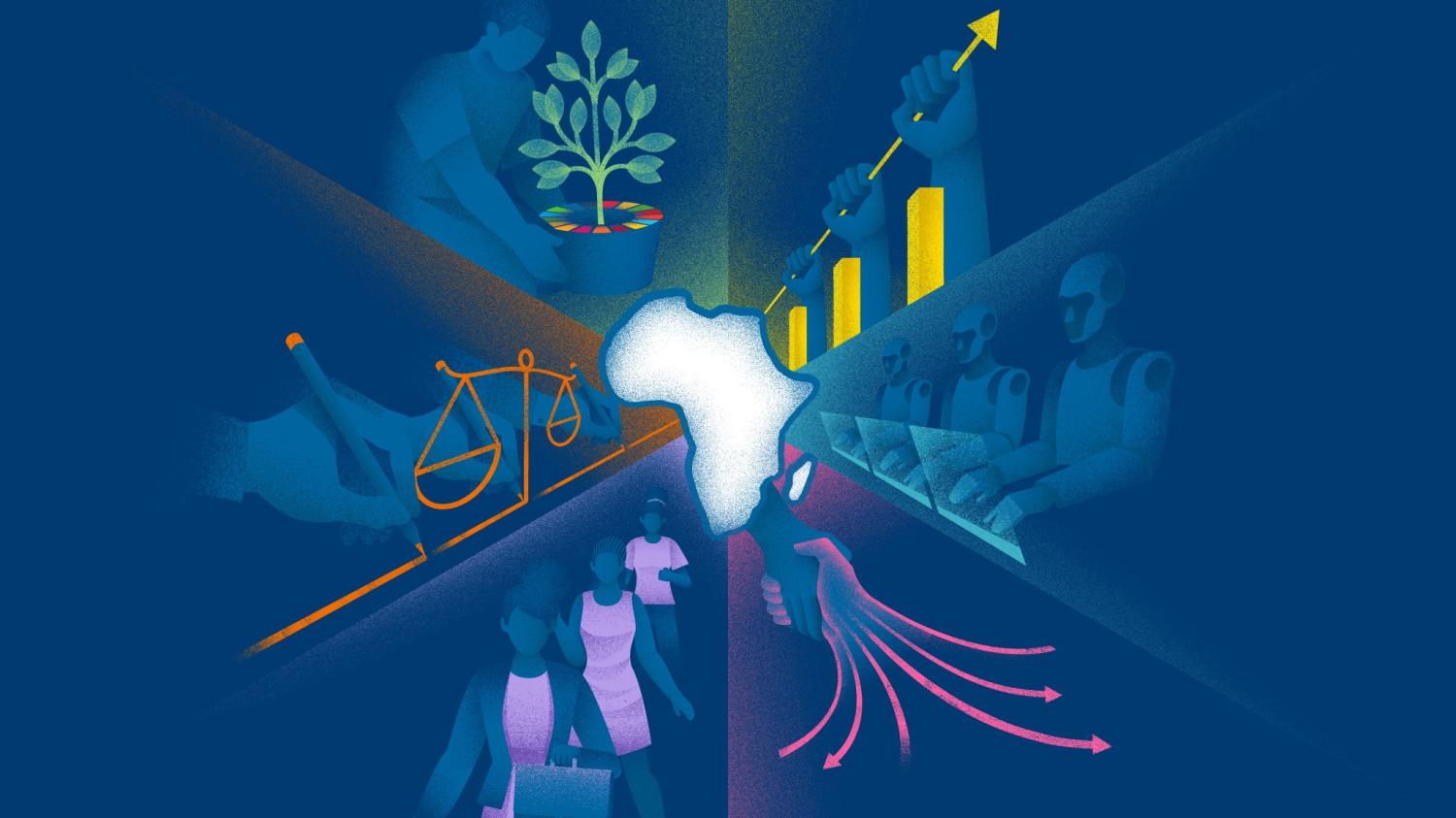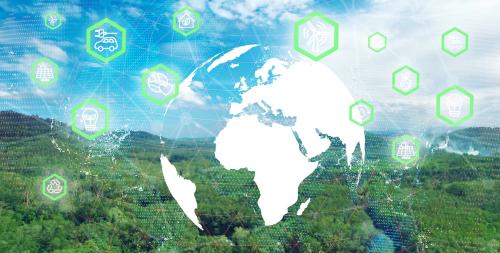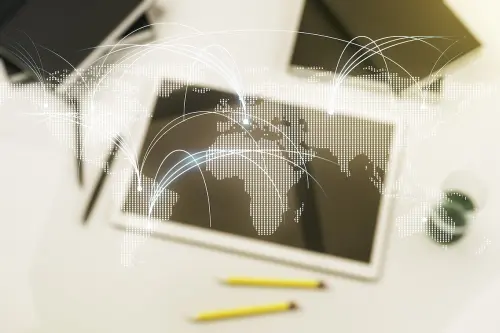This viewpoint is part of Chapter 2 of Foresight Africa 2025-2030, a report with cutting-edge insights and actionable strategies for Africa’s inclusive and sustainable development in the run-up to 2030. Read the full chapter on the Sustainable Development Goals.
As global leaders reflect on pathways to achieving the SDGs, Morocco’s experience
underscores the power of transformative leadership, targeted reforms, and an unwavering commitment to inclusive development.
Morocco has recently charted an extraordinary path toward economic resilience and sustainable development. Over the past two decades, the Kingdom has demonstrated its unwavering commitment to achieving the Sustainable Development Goals (SDGs) through structural reforms, inclusive policies, and transformative initiatives. King Mohammed VI’s strategy has emphasized inclusive growth, which has reduced inequality, and safeguarded social cohesion, laying the groundwork for sustainable prosperity.
Economic transformation: Diversification and resilience
Transitioning from a low-income to a lower-middle-income country, Morocco has cultivated a diversified economy with resilient fundamentals. Over the past decade, the Kingdom’s GDP growth averaged 3.2% annually, despite a severe downturn during the COVID-19 pandemic (Figure 9).1 This growth was predominantly driven by strategic sectors such as renewable energy, automotive, and agriculture. Key achievements include becoming the largest car manufacturer in Africa, exporting 700,000 vehicles in 2024, shifting toward electric vehicles,2 and generating over $14 billion annually in export revenues, benefiting from one of the largest port infrastructures in the region (Tangier Med).3
The renewable energy sector is another pillar of Morocco’s transformation. The Noor Ouarzazate Solar Complex is one of the largest concentrated solar power plants globally. While there have been some challenges in managing such an immense complex, overall, this project exemplifies Morocco’s ambition to derive 52% of its energy capacity from renewable sources by 2030. This commitment not only mitigates climate risks but also underscores Morocco’s global leadership in advancing SDG 7 on affordable and clean energy.
Social transformation: Prioritizing inclusion
Morocco’s journey toward the SDGs is deeply anchored in a strong social orientation. King Mohammed VI’s administration has prioritized inclusive policies to address poverty, inequality, and access to basic services. The launch of the Generalization of Social Protection project in 2021 represents a groundbreaking initiative aimed at extending health coverage to 22 million Moroccans by 2025.4 Similarly, the introduction of direct cash transfers to vulnerable households launched at the end of 2023 will improve the living conditions of nearly 7 million children and 3 million families,5 demonstrating the government’s commitment to SDG 1 on eradicating poverty.
Investments in education and health care have also yielded significant dividends. Net primary school enrollment increased to 99% in 2022,6 while maternal mortality rates fell from 227 per 100,000 live births in 2004 to 72.6 in 2020.7 These advances exemplify Morocco’s dedication to ensuring that no one is left behind in its development trajectory.
Shared insights for global leaders
Morocco’s positive development path has been underlined by some key factors:
- Invest in infrastructure and diversification: Strategic investment in high-impact sectors such as renewable energy and industry drives economic transformation and generates employment opportunities.
- Strengthen social safety nets: Implementing universal health coverage and direct cash transfer programs ensures inclusive growth while reducing inequality.
- Adopt a long-term vision: Strong leadership and a clear strategic vision, as exemplified by the New Development Model, are critical to achieving sustainable development.
- Harness partnerships: Leveraging international cooperation, such as Morocco’s partnerships with the World Bank and IMF, amplifies progress on global goals.
As global leaders reflect on pathways to achieving the SDGs, Morocco’s experience underscores the power of transformative leadership, targeted reforms, and an unwavering commitment to inclusive development. By embracing these principles, nations can not only build economic resilience but also secure a brighter, more sustainable future for their citizens.
-
Footnotes
- “Overview: The World Bank in Morocco,” World Bank, accessed December 11, 2024, https://www.worldbank.org/en/ country/morocco/overview.
- Sam Metz, “Morocco Prepares for its EV Era,” Associated Press, May 15, 2024, https://apnews.com/article/moroccoautomobile-industry-electric-vehicles-2981a049578c411b95b525752d243f93.
- Ahmed Eljechtimi, “Morocco’s Tanger Med Port Expects to Exceed Nominal Container Capacity,” Reuters, June 10, 2024, https://www.reuters.com/business/moroccos-tanger-med-port-expects-exceed-nominal-containercapacity-2024-06-10/.
- El Otmani, “Social Protection Generalization Shows Outlines of HM the King’s Social Policy to Build Morocco of tomorrow,” MapNews, April 15, 2021, https://www.mapnews.ma/en/actualites/politics/social-protectiongeneralization-shows-outlines-hm-kings-social-policy-build.
- Abderrafie Zaanoun, “The Intersections of the Political and the Technical in the Design of Morocco’s Social Targeting System,” Arab Reform Initiative, September 20, 2024, https://www.arab-reform.net/publication/the-intersections-of-thepolitical-and-the-technical-in-the-design-of-moroccos-social-targeting-system/.
- Veronika Samborska, “Primary Education in Morocco: From Less than Half to Nearly Universal Attendance,” Our World in Data (blog), April 26, 2024, https://ourworldindata.org/data-insights/primary-education-in-morocco-from-less-thanhalf-to-nearly-universal-attendance.
- Sanae Elomrani et al., “Approaching the SDG Targets with Sustained Political Commitment: Drivers of the Notable Decline in Maternal and Neonatal Mortality in Morocco,” BMJ Global Health 9, no. Suppl 2 (May 6, 2024): e011278, https://doi.org/10.1136/bmjgh-2022-011278.
The Brookings Institution is committed to quality, independence, and impact.
We are supported by a diverse array of funders. In line with our values and policies, each Brookings publication represents the sole views of its author(s).








Commentary
Morocco’s journey toward achieving the SDGs: Prioritizing economic resilience and social transformation
March 27, 2025